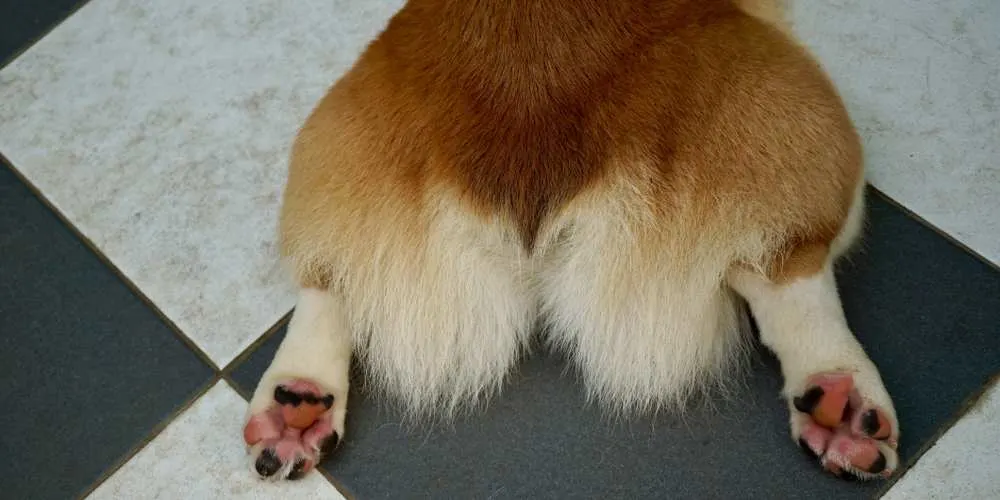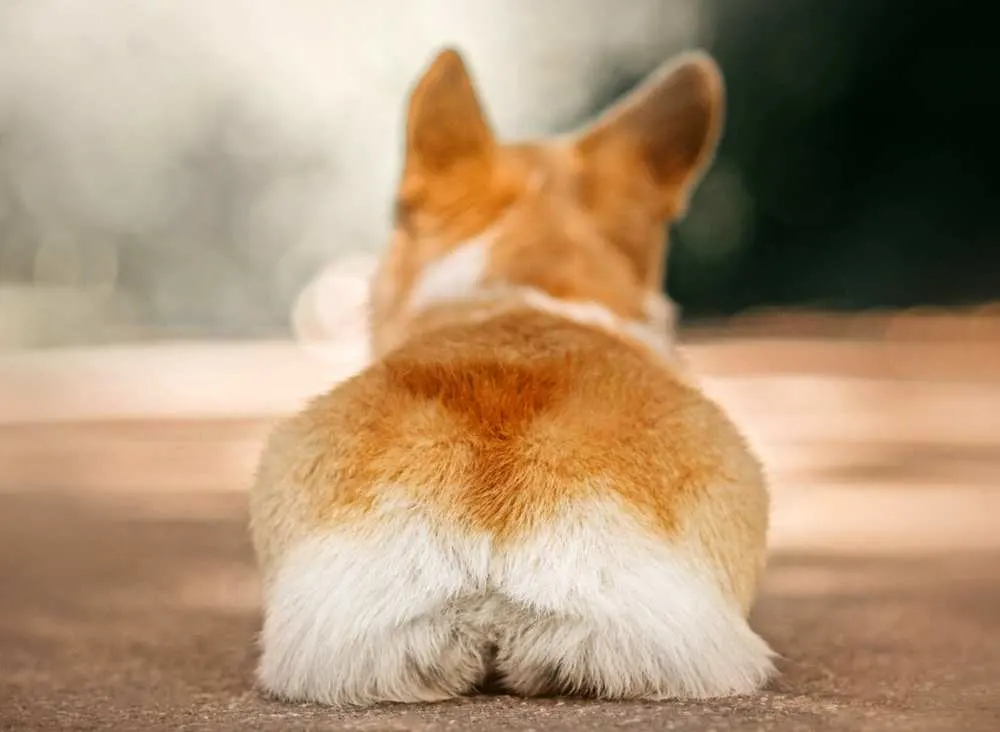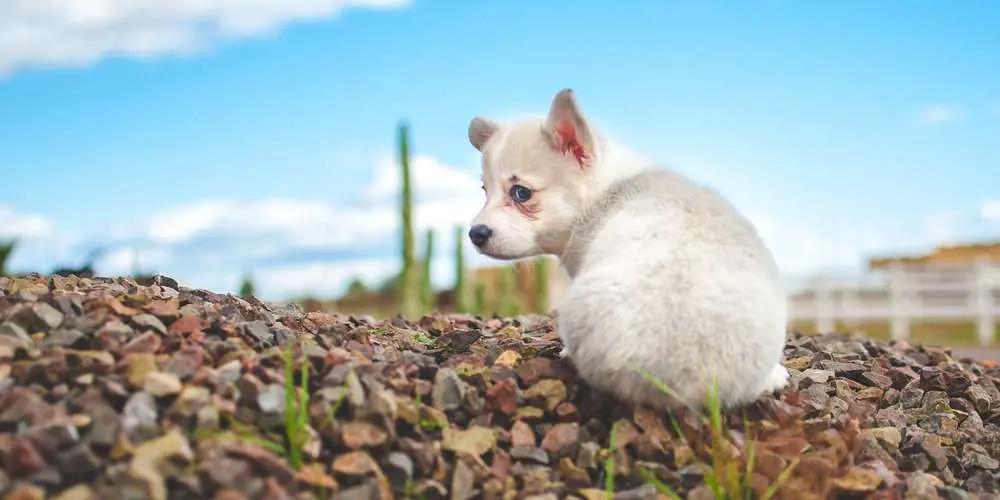There’s no easy and polite way to introduce this topic to you – today, we will talk about anal glands. Yuppy Yay!
All dogs, cats, well, all carnivore species have them; yes, this includes us, humans. These are small marble-sized sacs that contain malodorous substances; let’s call it that. They are located between your pet’s internal and external anal sphincter muscles. You may be very much aware of these anatomical parts if you ever owned a dog.
When they become frightened, they tend to let those nasty glands explode, delivering us with the smell from hell! Literally! Also, they tend to scoot their bottom along with your favorite rug with the smelly butt since these nasty sacs are prone to become itchy, or they might be so unfortunate and experience developing an anal gland infection. In all these cases, an awful smell will appear.
If your Corgo doggo and you were lucky enough and never had their butt glands unexpectedly explode and release the smell from hell, you might be wondering if everything is okay? Do Corgis need their glands expressed if they never did it naturally? Learn in the following text.

Anal Glands And Most Common Problems With Them
When problems with a dog’s anal glands occur, you can expect a lot of veterinary and groomer visits. Anal glands, also known as sebaceous glands, produce a liquid substance that has a foul odor which is yellowish in color. Usually, the liquid secretions are expressed when a dog defecates since the pressure of the firm feces encourages glands to empty completely.
The problem occurs when your dog has softer stools, and the anal glands are not fully expressed naturally. Also, some pups are born with narrow ducts; some produce excessive material; some dogs acquired damage to the anal ducts due to perianal infections, trauma, or inflammation; in all these cases, anal glands do not fully express naturally.
Sphincter dysfunction and obesity can lead to anal sac disease. Some breeds are more likely to need a monthly manual expression of anal glands, those breeds are:
- Chihuahuas
- Toy and Miniature Poodles
- Cocker Spaniels
- Lhasa Apsos
- Basset Hounds
- Beagles
If the anal glands get full or impacted, they usually get infected, and in some cases, they can even rupture. If left untreated, a serious condition called “perianal fistula” can develop. This is when an opening occurs from inside the anus to the skin.
Also, anal sac cancer (an aggressive form called adenocarcinoma) may occur, but the chances are much less than infection or impaction. When you notice blood, redness, or swelling around your dog’s anus, have it examined by your vet immediately, especially if your dog is prone to skin allergies. Allergies may cause swelling around anal ducts, which leads to difficulties in defecating or increased anal gland secretions.
Read Also: Do Corgis Get Cancer? Are Corgis Prone To Cancer?
Some dogs are more prone to anal gland problems than others, and the reason why isn’t yet known. Smaller dog breeds tend to have more anal sac impactions than bigger dog breeds. This is probably because their ducts are smaller and more likely prone to close when swollen or infected.
If your Corgi has problems with the anal glands, I advise you to do testings for hypothyroidism, hyperadrenocorticism, and skin infections that parasites, bacteria, or fungus can cause.
Also, some health conditions and concerns can enhance the chances of anal gland problems. Those are:
- Being overweight
- Diarrhea caused by illness or sudden change of food brand
- Food hypersensitivities
- Atopic dermatitis
- Chronic skin infections with the presence of bacteria or yeast
- Abnormal anal tone
- Obstruction of the anal gland duct
- Skin mite infestations

How Do I Know If My Corgi Needs His Anal Glands Expressed?
How do you know if a dog’s anal glands are full?
A pooch with anal gland problems or full anal glands will scoot their bottom along the floor, scratch, bite, and lick the bottom and tail., they will seem in pain and depressed since they will experience discomfort. This is all accompanied by a fishy smell at the back end. The symptoms to look for are:
- Dragging and scooting their bottom along the floor
- Scratch, lick, or bite at their bottom
- Smell rotten and fishy from their bottom
- Avoid wagging their tail
- Discomfort and depression
The rotten fishy smell occurred when the anal glands got too full, and they start leaking at all times, not only when the dog is toileting. Anal gland fluid has a very strong rotten fish smell, so when the glands are full, the secret can leak even when the dog is at rest. Do not pick them up since this will only enhance the leaking!
When you notice these things, it could be that your dog’s anal glands are not emptying as they should on their own. If this only happens occasionally, then all is normal, and there is no need for concern.
When the swelling becomes evident, an anal gland abscess is present. Also, bacterial overgrowth in the fully filled gland causes swelling, pus formation, ultimately rupture, and pain. Abscesses should always be soothed with a warm cloth and must be treated with antibiotics prescribed by your vet.
How Is Age A Factor For Anal Gland Problems?
Older dogs seem to have issued more often than younger dogs. The main theory is that they are unable to squat long enough and exert the same pressure when pooping so that the fecal matter can’t push hard enough against the glands and express them naturally.
The reason could also be arthritis, age-related health issues; however, not all older dogs have anal gland problems. But just in case if you have an older Corgi, I recommend that you keep an eye on him, and if you notice any symptoms, you take him to the vet.
See Also: Why Do Corgis Eat Poop?

Treating Corgis Anal Glands
Dog anal glands can be expressed in two ways – externally or internally. It is not recommended that dog owners try this at home because it can be difficult, messy, and potentially harmful for dogs.
The external expression should be done by placing a cloth or a towel over the glands and gently squeezing them. Don’t be surprised if you are not able to empty the gland externally fully. On the other hand, internal expression is the best way, but it is recommended to be performed by a vet; it involves gloves, lubrication, and palpating inside the anus.
Squeezing the glands in both cases should be done by applying steady pressure to milk the secretions from the inside of the gland through the duct opening near the anus.
Keep in mind that repetitive compression of the glands and ducts can cause a little traumatic inflammation at the site. So, if your Corgi has not exhibited symptoms of distended glands, you can consider both of you very lucky.
Most dogs that need help with draining their anal glands tend to require it about every three weeks. In case your Corgo doggo develops an impaction, it is recommended to flush the anal sacs with an antibiotic, antifungal, and anti-inflammatory medication every five to seven days for the period of two to three weeks.
If the impaction is severe or recurrent, it is fine to add a low dose of oral steroids that may speed recovery and reduce inflammation.
Do All Dogs Need Their Anal Glands Expressed?
No. Most dogs do not need to have their anal sacs emptied manually since their anal sacs function normally and empty a small amount of anal gland fluid every time the dog goes potty.
Only when the anal glands do not empty naturally or do not empty enough should you consider expressing them manually to avoid them become impacted and infected.
Should You Remove Your Dog’s Anal Glands?
Suppose your dog has chronic anal gland infections, and you are sure his stool is firm. In that case, his diet is rich with fiber, his weight is managed, exercise is on point, and he is not prone to allergies; then only then should you think about surgical anal gland removal or anal sacculectomy.
Surgery in this delicate area can often cause fecal incontinence. That is the main reason why surgery should not be done as a first step in managing anal gland disease since all sorts of medication are available for this problem now.
Preventative care includes:
- Practicing good hygiene and regular grooming
- Awareness of the problematic anal glands
- Learning to recognize the signs of inflammation
In my opinion, this is the last resort after all medical treatments that you can try. There are cases when dogs who had their anal glands removed continue to bootie scooting since the real culprit was a skin allergy and not an anal gland.

In The End, It Is All About Helping Your Corgi
There is always a way to help your pup avoid any health concerns he might experience. All you have to do is take some preventive measures. Here are few crucial and simple steps you can take to reduce the recurrence of impacted anal glands in your pup:
- Make sure your Corgi is getting enough fiber with their food, so they are able to produce healthy stool. Talk to your vet about the best diet for your pup.
- If your dog is obese, talk to your vet about taking the right steps to help them reach and maintain a healthy weight.
- Identify and treat any potential underlying causes.
- Supplement your Corgi’s diet with fish oil, which has anti-inflammatory properties that may help reduce the irritation around impacted glands. Talk to your vet about the best product for your dog.
While this is not a pleasant topic to talk about nor to think about but anal gland problems are very common that it pays to be vigilant in keeping an eye on them. The next time you see your dog scooting or licking its rear end, pay close attention to what’s going on back there since your pooch is not able to tell you what’s bothering him.

